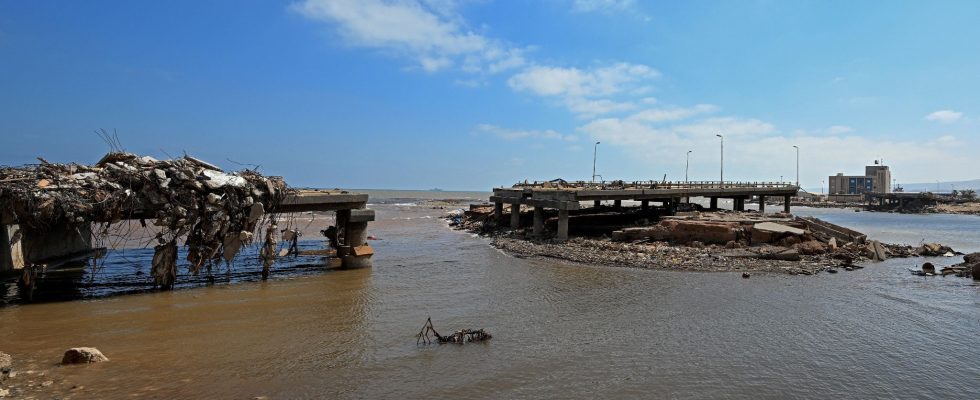It is a threat of catastrophe that threatens grieving Libya. On September 10, this coastal town of 100,000 inhabitants in the east of the country was hit hard by storm Daniel, causing the rupture of two dams and causing nearly 3,300 deaths, according to the latest official figures cited by the AFP.
And the toll could be even heavier in the days to come: international humanitarian organizations and Libyan officials estimate that thousands of residents are still missing in this battlefield-like city.
While the search by Libyan and foreign rescuers continues this Monday, September 18, the United Nations (UN) is warning of a new risk of spreading diseases. A consequence of the natural disaster which does not only affect Libya.
Water contaminated by corpses
In a statement released this Monday, the UN support mission in Libya (Manul) indicates that “local authorities, aid agencies and the WHO (World Health Organization) team are all concerned about the risk of spreading disease, particularly through contaminated water and lack of hygiene.
Indeed, the lack of access to drinking water caused by the disaster could cause water-borne diseases. According to the UN report, almost 300,000 children face “an increased risk of diarrhea and cholera, dehydration and malnutrition”, quotes the American daily New York Times.
As the Red Cross and the WHO reminded us on Friday September 15, the remains of victims of natural disasters generally do not present any particular health risk, contrary to deeply held belief. On the other hand, corpses left near drinking water sources can cause possible contamination by feces.
In Derna, already “150 people have been diagnosed with diarrhea after drinking contaminated water” reports the Wall Street Journal, according to figures from the director of the Libyan National Center for Disease Control Haider al-Saeih. Managing the dead is therefore transformed into an urgent public health mission: daily, dozens of bodies are washed up by the sea or extracted from the rubble of neighborhoods devastated by floods, before being buried in an apocalyptic landscape.
Survivors primarily responsible for epidemics
On site, the fear of a spread is also observed among the teams in charge of research. An AFP correspondent reports that the head of a group of rescuers sent by the United Arab Emirates on Sunday forbade his colleagues “from touching the bodies or opening the cars submerged under water”.
More than corpses, they are “those who survive an event such as a natural disaster [qui] are more likely to spread diseases,” the head of the medico-legal unit of the International Committee of the Red Cross (ICRC), Pierre Guyomarch, told AFP.
According to the press release from the UN support mission in Libya (Manul), teams from Unicef and the UN Children’s Fund have provided in recent days “emergency medical kits” to the primary care services to support 15,000 people for three months. “The team [de l’OMS] continues to work to prevent the spread of disease and avoid a second devastating crisis in the region,” the statement also added.
A vaccination campaign also began on Sunday among the populations most at risk, according to the Minister of Health of the Libyan government controlling the east of the country, “without specifying which vaccines would be offered or which diseases are targeted”, further comments the New York Times.
Similar cases of contamination in Europe
This phenomenon of spread of diseases following floods is not confined to Libya. On the other side of the Mediterranean, the floods caused in Greece by the same storm Daniel on September 4 and 5 also caused water contamination, to a lesser extent.
After torrential rains, floodwaters carried pollutants, pesticides and waste, implying “risks to soil, groundwater, surface water, public health and food safety”, reports AFP researcher Katerina Kasimati from the University of Agronomy of Athens.
A large part of the supply network in the Pelion region was notably destroyed during the disaster, prompting the Greek Minister of Health to publicly warn that “the water is not drinkable”, after cases of gastro- enteritis. A week later, municipal teams continue to dispose of tens of thousands of farm animals killed by the storm and at risk of contaminating water, says Associated Press.
In May 2023, the European branch of the WHO also called on residents of flooded areas in the Balkans and Italy to “avoid drinking unboiled tap water” in the face of similar consequences. A situation which risks multiplying in the years to come, while global warming which strongly affects the Mediterranean basin increases the risks of episodes of heavy precipitation.
